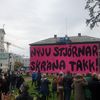The political crisis that Iceland is living now reflects the revolt of the civil society after 3 years of ruling of a governmental coalition (Progressive Party and Independent Party) that is perceived to have protected a ruling oligarchic elite in order to rebuild Iceland after the crisis with the motto: “business as usual“.
These are the voices heard in the streets of people protesting. “We want new elections: they all have to go“.
But wait a minute: Why is this government so impopular if macroeconomic data is positive and all seemed going in the right direction?
First of all, lets not forget that the leader of the Independent Party and the number 2 of the same party are also affected by the Mossack Fonseca disclosure of information. They are Ministers in the Government and have lost all creditibility. We have therefore a trio of top politicians at the epicenter of the worldwide tsunami of corruption.
But this crisis is not only due to the Panama leak scandal. Here is a short list of facts pointed by protestors and civil society leading to the resignation „de facto“ of Prime Minister Sigmundur Daviđ Gunnlaugsson and the constitutional crisis that Iceland goes through today.
Actions taken by Government during the period 2013-2016 that have created indignation among voters:
- After taking office, lowering taxes (fish licences) on the fishing industry but imposing austerity measures on the public budget (education, health, social policies)
- Stopping, derailing and watering down the constitutional reform (new constitutional project voted in a national referendum on 20 October 2012 and approved by 66% voters with a participation of almost 50%)
- Watering down the clause approved by more than 80% voters in October 2012 according to which natural resources had to be constitutionally protected as a collective good of the nation and be exploited at a fair market price for the benefit of the whole society.
- Ignoring the Parliamentary procedure, the promise of a referendum done to voters and sending unilaterally a letter to the European Union putting an end to the accesion of Iceland to this supranational organisation in the spring 2015 (+ 53.000 people protested against it and asked for the promised referendum)
- Putting the health system at the edge of collapse (in spite of more than 85.000 signatures urging Government to dedicate proper budgetary resources to health) and planning for a partial privatisation in spite of 80% public opinion that wants a public sector
- Selling companies to families of political leaders under market prize (ie. recent Borgun scandal Involving Minister of Finance).
- Ignoring the needs of the tourism industry, giving this sector special VAT regime and failing to protect a fragile environment/landscape under stress of millions of visitors
- Using public budget to rescue private-debtors in 2015 (households affected by price-indexed loans which doubled after the crisis)
- Failing to attact the real cause of the credit market and housing problem (indexation of credit to inflation ex-post contrary to European consumer credit law (as confirmed by EU and EEA institutions such as European Commission, EFTA Surveillance Authority and EFTA Court)
- For the former Prime Minister, offering a solution to creditors trapped in Iceland due to exchange currency controls while being married to one of them (Wintris company registered in Tortola). Keeping this information secret in spite of rules on transparency adopted by Parliament. Claiming all taxes are paid in Iceland on that company knowing the Icelandic tax authorities cannot obtain financial information from Panama.
- Defending the Icelandic króna (ISK) as the best monetary currency for Iceland while enjoying all money abroad in hard currency (dollars/eurs) (taken out before the financial crisis on the basis of priviledged information and thus avoiding 60% collapse of its value vs. euros from October 2008). Hiding this from the general public.
- Creating a housing buble encouraging foreign investment through Central Bank auctions - buying the ISK with a 20% profit (money owned by Icelanders abroad)
- Planning to go ahead with privatisation of public owned bank Landsbankinn
- Planning a future amnesty for money returning from tax havens
- The list is long and will be completed very shortly with input from other Icelandic contributors.
So here is the conclusion. The Government indeed can claim a set of good economic policies and good performance but people do not seem to care about economic data anymore. It is all about corruption, honesty, fairness, redistribution of wealth and social justice. Unfortunately citizens perceive all these policies as decisions of a corrupted set of leaders with no ethics, protecting their own millionaire interests and business class. The Panama papers provide furthermore the evidence that was missing. A substantial majority of people believe now that the money from the failed Icelandic banks did not evaporate in the air, as we were told by those at the top...... On the contrary, they think that it is very well secretly hidden in the Caribbean. All leads to a perception of intolerable corruption, while the owners of those opaque secret companies walk around the streets of Reykjavík they enjoy for free all public services that are financed by tax voters and ordinary citizens...
This double standard explains the anger in the streets and the slogan “Tortola Government: go home“
Flokkur: Stjórnmál og samfélag | Breytt 7.4.2016 kl. 09:31 | Facebook


 axelaxelsson
axelaxelsson
 agbjarn
agbjarn
 bjarnimax
bjarnimax
 eyvar
eyvar
 rustikus
rustikus
 einarbb
einarbb
 eirikuro
eirikuro
 eyrun
eyrun
 iador
iador
 himmalingur
himmalingur
 ingibs
ingibs
 islandshreyfingin
islandshreyfingin
 fun
fun
 jevbmaack
jevbmaack
 jonasantonsson
jonasantonsson
 nonniblogg
nonniblogg
 jonvalurjensson
jonvalurjensson
 juliusvalsson
juliusvalsson
 photo
photo
 krisjons
krisjons
 margretsverris
margretsverris
 omarbjarki
omarbjarki
 oskvil
oskvil
 ragjo
ragjo
 redlion
redlion
 sjos
sjos
 siggi-hrellir
siggi-hrellir
 siggith
siggith
 savar
savar
 valli57
valli57
 tbs
tbs





Bćta viđ athugasemd [Innskráning]
Ekki er lengur hćgt ađ skrifa athugasemdir viđ fćrsluna, ţar sem tímamörk á athugasemdir eru liđin.